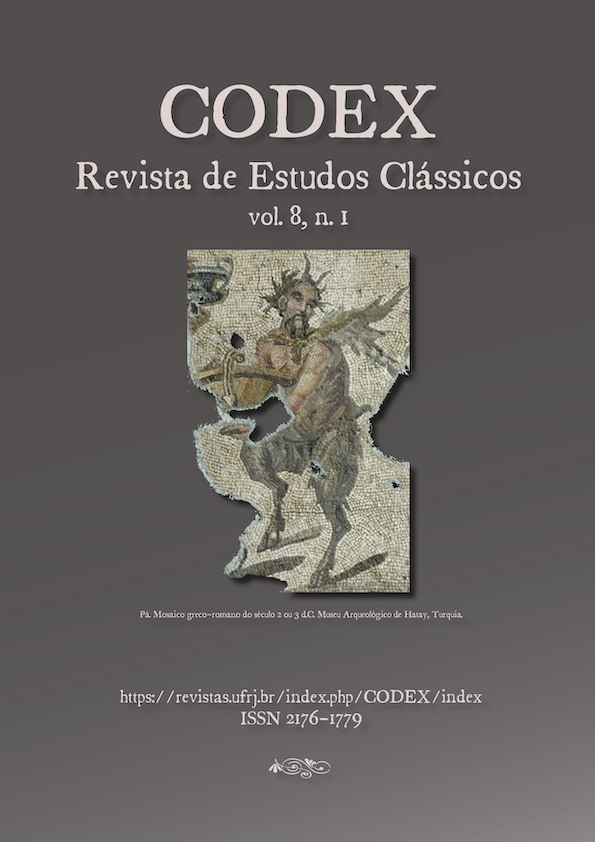Gender and characterization in Euripides’ "Medea"
DOI:
https://doi.org/10.25187/codex.v8i1.32820Keywords:
Euripides, Medea, characterization, genderAbstract
This paper looks into the characterization of the figure of Medea in Euripides’ homonymous play. At first, I consider how her speeches conform to speech patterns usually identified as feminine in tragedy and how she uses deceptive expressions of submission to dupe her opponents. Secondly, I investigate to what extent her linguistic characterization also contains traces of a heroism more typically masculine, offering a glimpse of the fears and anxieties underlying feminine stereotypes of tragedy.
References
ALLAN, William. Euripides: Medea. London: Duckworth, 2002.
BOEDEKER, Deborah. Euripides' Medea and the Vanity of ΛΟΓΟΙ. Classical Philology, Chicago, v. 86, n. 2, p. 95-112, 1991. Disponível em: <https://www.jstor.org/stable/270231>. Acesso em 20 maio 2019.
BLONDELL, Ruby. Medea. In: BLONDELL, Ruby et al (Ed.). Women on the Edge: Four plays by Euripides. New York/London: Routledge, 1999. p. 147-215.
BONGIE, Elizabeth Bryson. Heroic Elements in the Medea of Euripides. Transactions of the American Philological Association, Baltimore, v. 107, p. 27-56, 1977. Disponível em: <https://www.jstor.org/stable/284024>. Acesso em 20 maio 2019.
BURNETT, Anne. Medea and the Tragedy of Revenge. Classical Philology, Chicago, v. 68, n. 1, p. 1-24, 1973. Disponível em: <https://www.jstor.org/stable/268785>. Acesso em 21 jul. 2019.
BURNETT, Anne Pippin. Connubial Revenge: Euripides' Medea. In: ______. Revenge in Attic and Later Tragedy. Berkeley: University of California Press, 1998. p. 192-224.
CHONG-GOSSARD, James H. Kim On & LI NG, Lin. Euripidean Women and Internalized Misogyny: Agones in Troades, Electra, and Andromache. In: PRATT, Louise; SAMPSON, C. Michael (Ed.). Engaging Classical Texts in the Contemporary World: From Narratology to Reception. Ann Arbor: University of Michigan Press, 2018. p. 71-90.
CUNNINGHAM, Maurice P. Medea ΑΠΟ ΜΗΧΑΝΗΣ. Classical Philology, Chicago, v. 49, n. 3, p. 151-160, 1954. Disponível em: <https://www.jstor.org/stable/265931>. Acesso em 21 jul. 2019.
EASTERLING, P. E. Women in tragic space. Bulletin of the Institute of Classical Studies, Oxford, n. 34, p. 15-26, 1987. Disponível em: <https://www.jstor.org/stable/43646826>. Acesso em 24 jun. 2019.
EMDE BOAS, Evert. Euripides. In: TEMMERMAN, Koen de; EMDE BOAS, Evert. Characterization in Ancient Greek Literature. Brill: Leiden, 2017. p. 355-374.
EURÍPIDES. Teatro completo. Volume 1. Tradução de Jaa Torrano. São Paulo: Iluminuras, 2015.
EURIPIDES. Medea. Edited by Donald J. Mastronarde Cambridge : Cambridge University Press, 2002.
FLORY, Stewart. Medea's Right Hand: Promises and Revenge. Transactions of the American Philological Association, Baltimore, v. 108, p. 69-74, 1978. Disponível em: <https://www.jstor.org/stable/284236>. Acesso em 27 jul. 2019.
FOLEY, Helene P. Tragic Wives: Medea’s Divided Self. In:______. Female acts in Greek tragedy. Princeton: Princeton University Press, 2001. p. 243-271.
GOULD, John. Law, Custom and Myth: Aspects of the Social Position of Women in Classical Athens. The Journal of Hellenic Studies, Cambridge, v. 100, p. 38-59, 1980. Disponível em: <https://www.jstor.org/stable/630731>. Acesso em 24 jun. 2019.
GREDLEY, Bernard. The place and time of victory: Euripides’ Medea. Bulletin of the Institute of Classical Studies, Oxford, n. 34, p. 27-39, 1987. Disponível em: <https://www.jstor.org/stable/43646827>. Acesso em 27 dez. 2018.
GRIFFITH, Mark. Antigone and Her Sister(s): Embodying Women in Greek Tragedy. In: LARDINOIS, André; MCCLURE, Laura (Ed.). Making Silence Speak: Women’s Voices in Greek Literature and Society. Princeton/Oxford: Princeton University Press, 2001. p. 117-136.
KNOX, Bernard. The Medea of Euripides. In:______. Word and action: essays on the ancient theater. Baltimore/London: Johns Hopkins University Press, 1979. p. 295-322.
KOVACS, David. Zeus in Euripides' Medea. The American Journal of Philology, Baltimore, v. 114, n. 1, p. 45-70, 1993. Disponível em: <http://www.jstor.org/stable/295381>. Acesso em 12 jul. 2012.
LORAUX, Nicole. Sur la race des femmes et quelques-unes de ses tribus. Arethusa, Baltimore, v.. 11, p. 43-87, 1978. Disponível em: <https://www.jstor.org/stable/26308154>. Acesso em 30 out. 2018.
MCCLURE, Laura K. Female speech and characterization in Euripides. In: DE MARTINO, Francesco; SOMMERSTEIN, Alan H. (Ed.). Lo spettacolo delle voci. Parte Seconda. Bari: Levante Editori, 1995. p. 35-60.
RECKFORD, Kenneth J. Medea's First Exit. Transactions of the American Philological Association, Baltimore, v. 99, p. 329-359, 1968. Disponível em: <https://www.jstor.org/stable/2935850>. Acesso em 17 jul. 2019.
SEGAL, Charles. Euripides' Medea: Vengeance, Reversal and Closure. Pallas, Toulouse, n. 45, p. 15-44, 1996. Disponível em: <https://www.persee.fr/docAsPDF/palla_0031-0387_1996_num_45_1_1392.pdf>. Acesso em 25 out. 2018.
WILLIAMSON, Margaret. A Woman's Place in Euripides' Medea. In: POWELL, Anton (Ed.). Euripides, Women, and Sexuality. London/New York: Routledge, 1990. p. 16-31.
ZERBA, Michelle. Medea Hypokrites. Arethusa, Baltimore, v. 35, n. 2, p. 315-337, 2002. Disponível em: <https://muse.jhu.edu/article/2688>. Acesso em 27 dez. 2018.
Downloads
Published
How to Cite
Issue
Section
License
This work is licensed under a Creative Commons Attribution-NonCommercial 4.0 International License.










